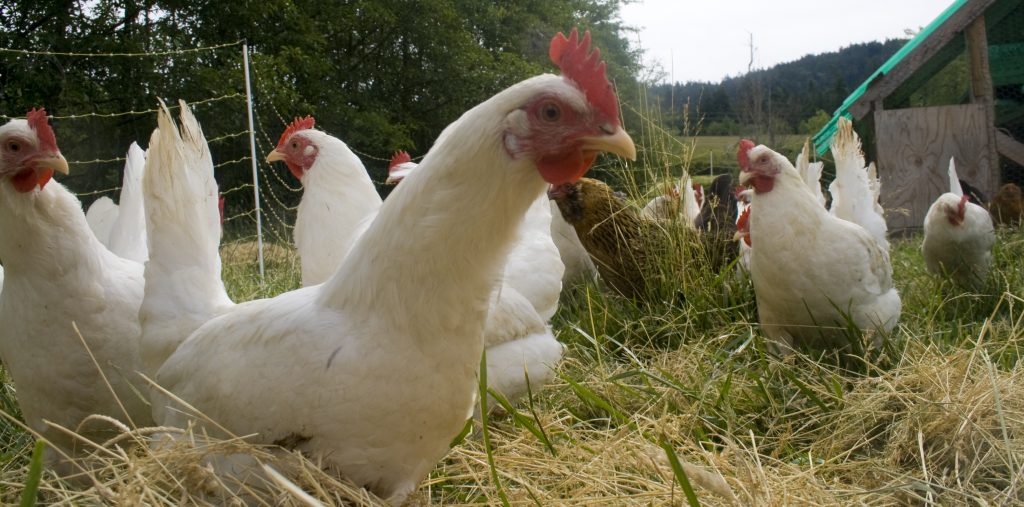Highly Contagious Bird Flu Detected in County
First discovered in Jefferson County, has spread to variety of birds in Milwaukee and other counties.

Free-range chickens. The confirmation of bird flu at an Iowa egg-laying farm will force the killing of more than 5 million chickens, officials said Friday, March 18, 2022. Spread of the disease is largely blamed on the droppings or nasal discharge of infected wild birds, such as ducks and geese, which can contaminate dust and soil. File photo by woodley wonderworks, (CC BY 2.0), via Wikimedia Commons.
A strain of the highly pathogenic bird flu found in March on a poultry farm in Jefferson County has now been detected in wild birds.
The Wisconsin Department of Natural Resources announced Thursday that the EA H5N1 bird flu strain was found in samples collected from wild birds in Dane, Columbia, Grant, Milwaukee and Polk counties. The strain has been detected across a variety of birds, including a Cooper’s hawk, bald eagle, lesser scaup, red-tailed hawk, Canada goose and a trumpeter swan.
Avian influenza is caused by a virus common to wild birds like waterfowl and shorebirds, but they often carry it without causing disease. The DNR along with state and federal partners have increased monitoring of waterfowl, raptors and scavengers, such as crows, as part of the agency’s response with plans for additional testing.
“The reason it’s important is because it does cause some clinical disease in some of our waterfowl and waterbirds,” Lindsey Long, a DNR wildlife veterinarian, said. “We’ve seen some mortalities associated with it and those species. And, we’ve also seen mortalities associated with the birds that consume those birds.”
Long said all birds sampled had died, but not all necessarily died from the virus. The agency is asking the public to notify the DNR if they spot birds showing signs of tremors, swimming or flying in circles, or holding their heads in an unusual position. Long said birds that display such symptoms are unlikely to recover from the virus.
“With a high (pathogenic) virus, once it’s introduced to domestic birds, you normally see a high number of birds that die, and it transmits very easily between them,” Long said.
The highly contagious bird flu doesn’t pose an immediate threat to public health or threaten food safety because the virus is killed when birds or their eggs are properly handled and cooked, according to the Centers for Disease Control and Prevention. The strain has not been detected in humans in the United States.
The agency said depopulation of the farm was completed Wednesday and compost disposal of the birds is being conducted at a nearby site in Palmyra. State agriculture officials say composting is the safest and most effective way to handle the large volume of birds that were culled.
Long said commercial producers and backyard poultry owners can minimize risks to their birds by following strict biosecurity protocols outlined by DATCP.
Kevin Hoffman, a DATCP spokesperson, urged them not to share feed or water sources between domestic and wild birds.
“Also make sure that you’re restricting access to your birds and keeping them away from wild birds or where wild birds may be present,” Hoffman said. “Maybe keeping a designated pair of shoes to wear around your birds that you wouldn’t wear off-site.”
Hoffman also advised producers and poultry owners to keep any new birds that are being added to flocks separate from existing flocks for 30 days.
As for songbirds, Long said they aren’t typically exposed to the virus. She advised people to remove any bird feeders in areas where waterfowl may be interacting with them or below them.
The DNR is advising people to minimize contact with any sick or dead birds and wear gloves if handling them. Long said people should double-bag any carcasses they find and wash hands with soap and water and dispose of gloves.
Long said turkey hunters can take precautions during the upcoming season, but she noted wild turkeys prefer habitat that make them less likely to encounter the virus in the wild.
The disease has been found in multiple sates since it was first discovered in North America in December. The DNR has been monitoring for the virus after it began circulating in Europe and Asia last year, and DATCP has been monitoring farms nearby the affected facility in Jefferson County.
State agriculture officials have said the strain appears similarly virulent to the one seen in 2015. The 2015 outbreak of bird flu in Wisconsin affected nine commercial operations and one backyard flock in less than 30 days, leading to the death of more than 1.9 million birds. The bird flu was only detected in one wild bird, a snowy owl, during the 2015 outbreak.
People can report dead or sick birds through the DNR Wildlife Hotline by leaving a message at 608-267-0866 or sending an email to DNRWildlifeSwitchboard@wi.gov.
Listen to the WPR report here.
Highly contagious bird flu detected in wild birds in Wisconsin was originally published by Wisconsin Public Radio.




















